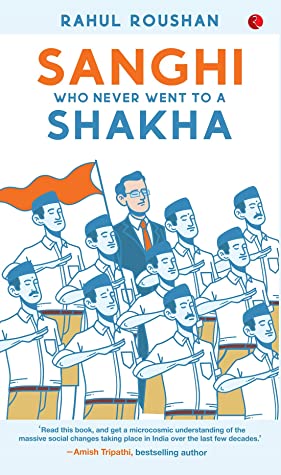Sanghi Who Never Went To A Shakha by Rahul Roushan - Review by Abhishek Desikan
Just the title of this book might be off-putting or a reason to mock for quite a few people in India, who consider themselves to be ‘liberal.’ The term ‘Sanghi’ has been tarnished and manipulated by an ecosystem to be a term of derision and hate. If you’re associated with a particular political outfit, organization or are simply assertive of your religious identity, you’re labeled ‘Sanghi."
And this is where the author, Rahul Roushan, begins his semi-autobiographical tale, expounding on his personal transformation from being a libertarian to a ‘Sanghi’ over the years, with the political backdrop of India. In this process, he touches upon many spheres and ideas - the Hindu identity, the hypocrisy of the left-liberals in India, and their dominant control of narratives, making a fallacious distinction between Hinduism and Hindutva, etc. He provides an insightful comparison between different historical and political incidents and even labels (Brahmins vs. Sufis, Kashmiri Pandits vs. Babri Masjid, etc.) to elucidate this duplicity.
There are two key themes the author explores during the book. One is the mindset of a ‘Congressi Hindu.’ This is someone who has a sense of belonging to being Hindu but doesn’t really understand the theological or political basis of this identity. Thus they are ever willing to accommodate and adjust the expanse of this identity. The second is on ‘responsible journalism.’ With his experience working with media outlets and then being an editor himself, Rahul exposes the patterns of Indian journalism to the reader. Most media houses believe that they’re doing the responsible act of maintaining communal harmony by under-reporting or changing narratives based on whether a Muslim is a perpetrator or a victim.
Finally, he speaks about the growing insecurities within the Congress, the various scams, and Narendra Modi’s rise as a man who gave hope to millions of regular Indians. He speaks of Modi’s pro-development and pro-India outlook compared to the Congress and the visceral attacks on him post-2014 by attributing every incident to divisiveness and breach in communal harmony. He also explains the crucial role of the rise of the internet and social media platforms like Twitter, which allowed for countering the agenda and questioning the media’s ideological bias. The BJP’s consecutive victory with a bigger majority in 2019 is a vindication of the mistrust of the Indian voter on the’ecosystem’ and how they need to introspect on their attitudes and behavior.
This book definitely hit home in many ways. I can see how many people, especially in my age group, can relate to Rahul’s story of becoming a ‘Sanghi’ without ever visiting a ‘Shakha.’ An excellent read to understand the media and narrative building over the years in India.

Originally published here.